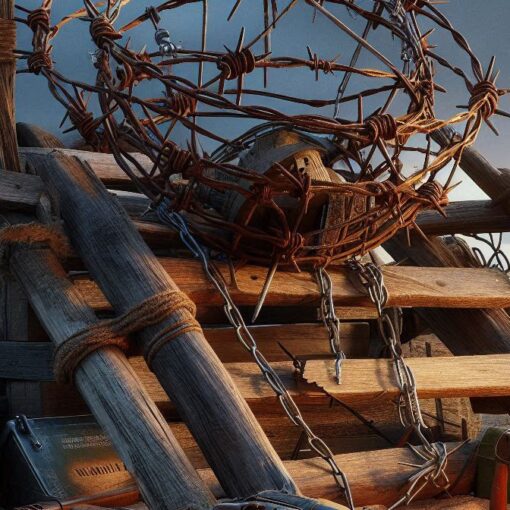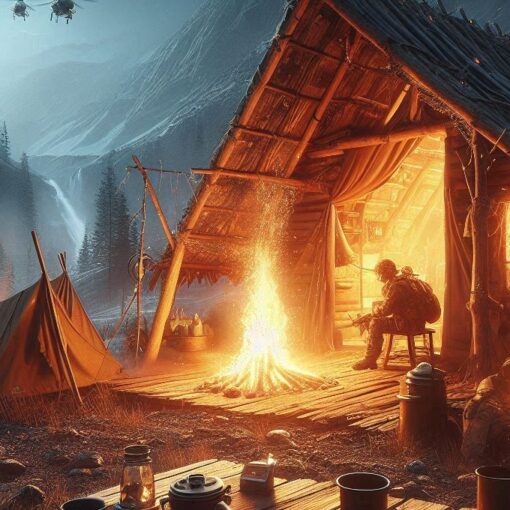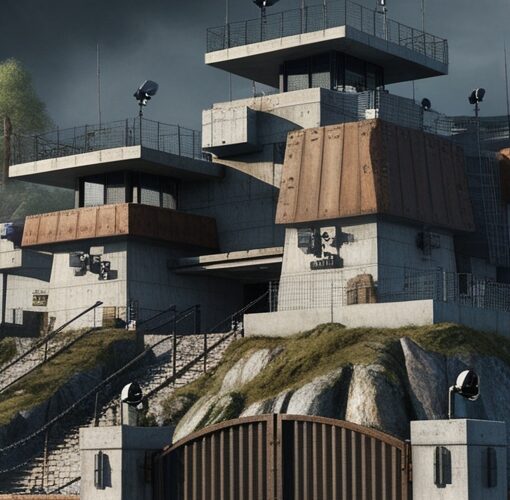Top Takeaways and Key Concepts
- Stay calm first to prevent panic and make clear decisions during unexpected situations.
- Assess your surroundings before acting to identify threats, resources, and options.
- Prioritize safety by handling the most urgent needs like shelter and protection first.
- Make fast decisions by trusting your instincts and avoiding hesitation in emergencies.
- Reflect after challenges to improve judgment and strengthen future crisis response skills.
Summary of This Article
This article explains how critical thinking can help you stay safe and effective during unexpected or survival situations. It emphasizes staying calm, assessing your environment, and prioritizing immediate needs like safety and shelter. It also encourages making confident decisions under pressure and learning from past experiences to improve your instincts over time. With practice and awareness, anyone can strengthen their decision-making skills and handle crisis situations with more confidence.
Short Video Version of this Article
Life can be full of surprises, can’t it? One minute you’re relaxed, and the next there’s a storm coming or a raccoon trying to steal your food. It’s crazy out there! It can be really helpful to know how to think rationally in those situations.
Please Note: This post may contain affiliate links. If you click one of them, we may receive a commission at no extra cost to you. As an Amazon Associate, I earn from qualifying purchases.
Imagine this: You hear a weird sound coming from the bushes. Is your companion dozing after eating too many s’mores, or is it a bear seeking for food? You can make better decisions when your mind is clear. Before you jump to conclusions, take a deep breath and look around.
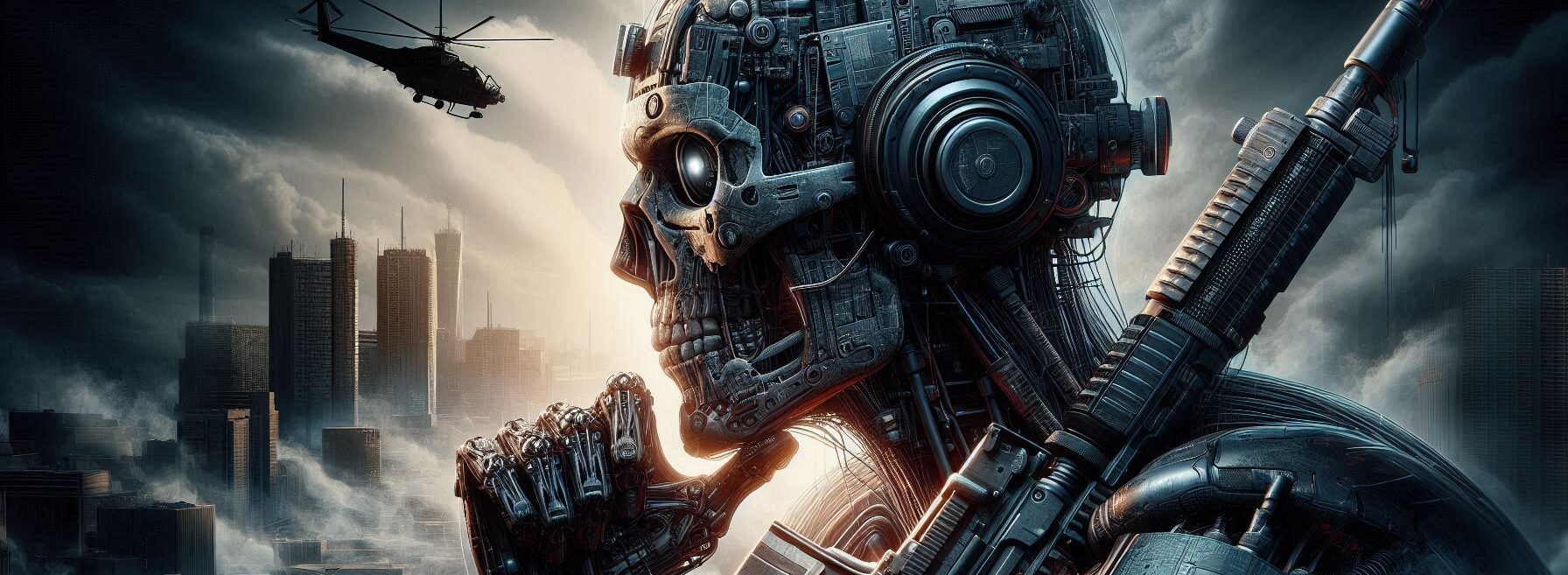
When you think critically, you stay cool and look at the problem. Look around if a storm is coming. Is there a place that is safe? Be smart if someone is sneaking around your campsite. Get your friends together and talk about what to do next in a low voice. You want to be protected, don’t you?
We can work on these talents every day. Pay attention to the small things at first. When you’re outside, think about what you would do if anything unexpected happened. You can learn a lot just by watching how animals act. They appear to know when to run away and when to keep motionless.
It can be useful to talk to friends about what you would do in tough situations. Play a game called “What if?” Talk to each other and ask questions to get ideas. This way, you’ll be a little more ready when something happens.
It’s good to be a little nervous occasionally when you have to think on your feet. Yes, everyone does! The most important thing is to take a deep breath and remember that you can do it. We can all improve our instincts and confront whatever comes our way with confidence. Let’s enjoy the adventure!
Understanding the Crisis Mindset
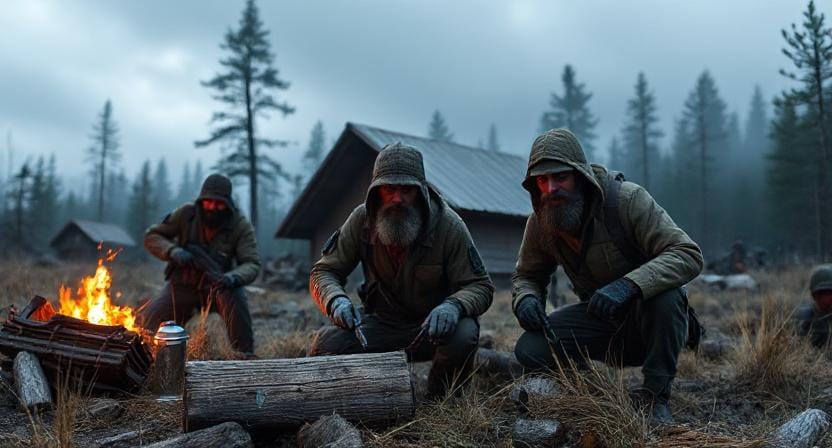
To begin, let’s talk about what it means to be in “crisis mode.” It sounds like something out of an action movie when the hero has only a few seconds to save a cat caught in a tree and detonate a bomb at the same time. But in truth, it’s more about staying calm when things go wrong.
When we’re in a crisis, our brains may really race, right? It seems like every tiny sound is tremendously loud. Was that simply the wind? Or did I forget about my sandwich and now a squirrel is eating it? When things get tense, it’s natural to jump to conclusions.
Knowing that our brains work this way can help us become ready. Panic doesn’t help. It’s really helpful to take a deep breath. When we think clearly, we can make better decisions.
Training your brain is like working out your mind. You can practice quiet thinking just like you exercise weights to get stronger. Think about whether you want mustard or ketchup on your hot dog. It’s a little decision, but it gets your brain going.
It gets simpler when you practice in simple circumstances, like choosing toppings for your meal or arranging a fun day. You’ll be better able to deal with something bigger later.
It’s also great to have a plan. Think about what you would do if something unexpected occurred. When you talk to friends, you might come up with ideas jointly.
Every step you take matters. It’s really crucial to build this mental power. When things go rough, you’ll be surprised at how sure of yourself you are. Take on the small problems. They’re like practice for the bigger ones! It’s all about learning and growing together.
Assessing Your Environment
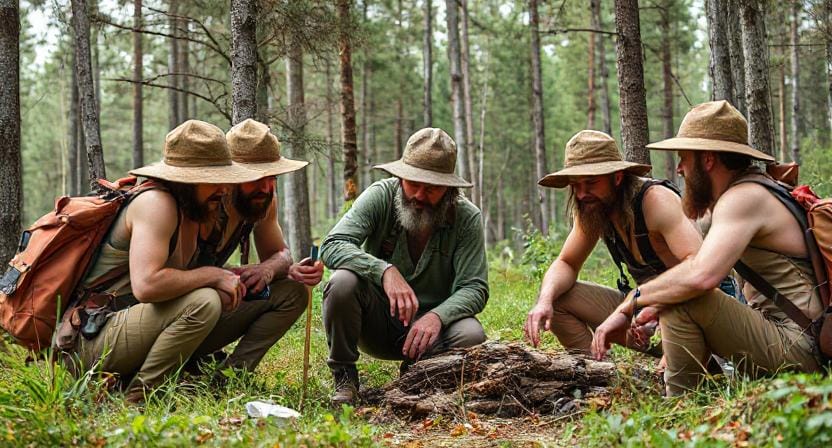
Now that we’re warmed up mentally, let’s get practical! One of the first steps in any crisis situation is assessing your environment. This means taking stock of what’s around you: What resources do you have? Are there potential threats nearby?
I remember this camping trip that was wild! Woke up to find my tent surrounded by raccoons. What a surprise! Imagine a fuzzy little mob just hanging out near your sleeping bag. At first, my heart raced. Talk about an unexpected wake-up call!
Instead of freaking out and tossing granola bars—yep, that crossed my mind—I paused. I took a second to think about what was happening. Were they ready to attack? Nope. They just wanted my snacks. Spoiler alert: they definitely wanted those delicious treats!
By watching how they acted, I was able to stay calm. I checked to see if they were being wild or just curious. It helped me figure out my next moves. I didn’t want to be raccoon bait, you know?
I wanted snacks safe and sound. So, I quietly secured the food instead of running away. That was a smart choice! Raccoons are clever little critters, after all.
Next time you’re faced with something surprising, remember my raccoon story. It’s okay to take a moment. Watching and thinking before acting helps a lot. It’s like taking a deep breath.
Each little adventure teaches us something new. You’ll find it’s easier to deal with surprises when you approach them like a plan. And hey, who doesn’t want to keep their snacks safe?
Prioritizing Needs
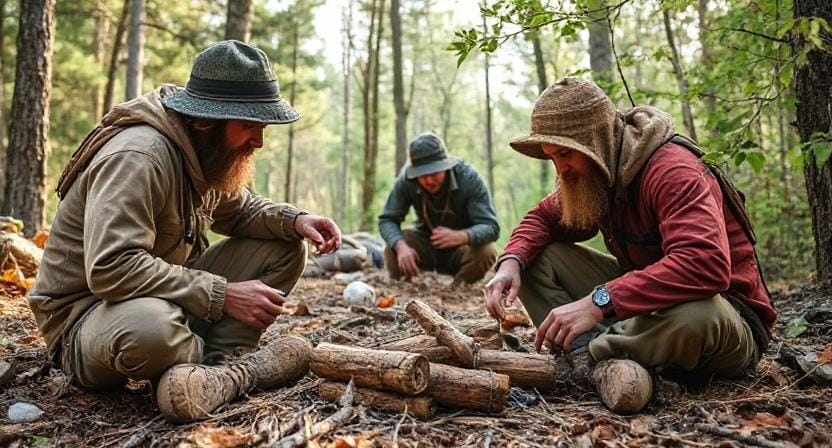
Once you’ve assessed your surroundings and figured out what’s happening—or at least have some idea—it’s time to prioritize needs. This step involves determining what requires immediate attention versus what can wait until later (like finishing that last piece of pizza).
In survival situations, we often think about shelter, water, food, and safety. It sounds simple, right? But sometimes you gotta switch things up. Picture this: an angry bear pops up out of nowhere. Suddenly, your plans for a nice snack break become less important. Safety jumps to the top of your list!
During another camping trip, it got a bit crazy. I lost track of my friend who was supposed to keep an eye on the fire. Not good! My favorite hat suddenly didn’t matter. What mattered was gathering everyone together quickly.
Remembering to prioritize is huge. We can’t worry about missing snacks or favorite things when something serious happens. It really helps to focus on what’s most important first.
When you’re out in nature, safety comes first. Water is a close second, and then you can think about food. It’s like making a checklist in your head, even when things feel a bit chaotic. Try to be calm, even when that bear is glaring at you or your fire is out of control.
You’ll feel better knowing you made the right choices. That way, when you finally get to relax with a snack, it’ll feel even better. Just thinking about a cozy time with friends and tasty treats after all that craziness is the best feeling ever!
Making Quick Decisions
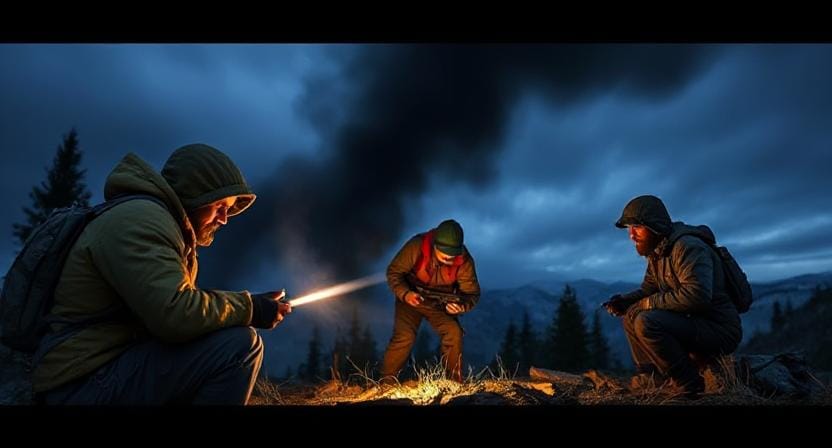
When you’re in crisis mode and your adrenaline kicks in, you’ll have to make quick decisions with little information. At first, this may seem scary, but keep in mind that not making a decision is typically worse than making the wrong one!
I went on a hike with some pals and I’ll tell you about it. We were deep in the woods, enjoying nature, when we heard some strange sounds. Very scary! We could either go see what it was or scamper away like scared rabbits.
We didn’t want to be the main characters in a weird wildlife show. We all weren’t in the mood for it! So, after a short talk, we decided to leave. Good idea, right?
It’s a big deal to choose safety over curiosity. It’s simple to think, “Oh, let’s see what that noise is.” But there are instances when you should just trust your instincts. Think about it. A noise that scares you could be a bear or a raccoon. In either case, it’s usually best to leave without finding out.
When those times come up, try to remember what’s most important. Think about your options quickly and trust your gut. It might help you stay out of trouble. Walking back to safety? That’s always a good thing! It sounds a lot nicer to have a cup of coffee and laugh with friends than to face whatever’s hiding in the bushes.
So, if you ever find yourself in a tough place, just take a deep breath, listen to your instincts, and remember that safety should always come first!
Learning from Experience
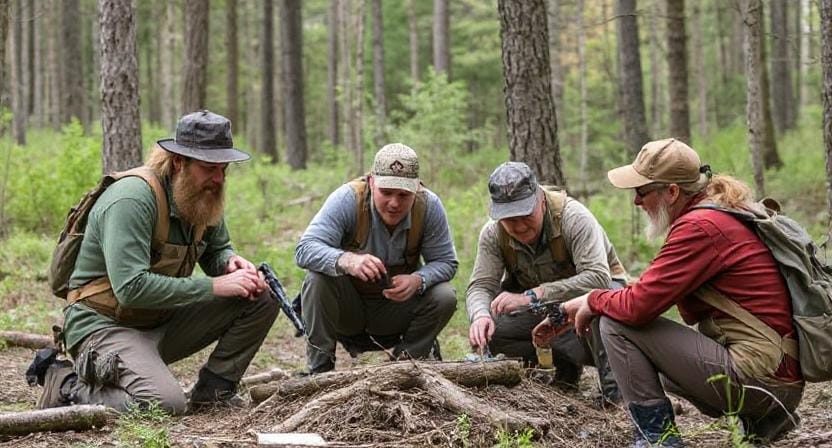
After every adventure, it’s super helpful to take a little time to think about what just happened. You know, like when something surprising or even embarrassing pops up? I remember one time during bushcraft training, I mistook poison ivy for regular plants. Ouch! Trust me, that lesson stuck with me.
Every little thing teaches us something. Even the mishaps that make us cringe can be valuable lessons. After each experience, it helps to sit down and reflect on what went well and what didn’t. Writing it all down in a journal could really help. That way, when you remember these moments, you can be better prepared for next time. And there will always be a “next time,” right?
When we think back on our experiences, we start to see patterns. What worked? What didn’t? It’s like tuning a guitar until it sounds just right. The more you reflect, the sharper your thinking skills become when stuff hits the fan.
So, next time something happens, spend a few minutes afterwards to jot down your thoughts. It doesn’t have to be fancy. Just simple notes. You might be surprised how helpful it can be when you’re out in the wild or anywhere else. Reflecting isn’t just about remembering; it helps us grow. And we all want to keep getting better, don’t we?
Conclusion
You don’t have to be an action hero to be in crisis mode; we can all learn to deal with hard times better. I mean, really think about it. Our minds might go into overdrive when something unexpected happens. But if you plan ahead and practice, you can get through those crazy times without feeling too stressed.
It’s quite helpful to know how you think when things go wrong. Picture yourself in a scary situation. Taking a moment to breathe and think about what’s going on can make a tremendous impact. Take a look around and quickly decide out what’s most important. Are you okay? Do you need some water? You can make wise choices without getting all worked up.
Getting your mind ready is like getting ready for a sport. It helps you stay calm when things don’t go as planned. You know that feeling when something surprises you? If you’ve trained critical thinking, you can reply appropriately instead of freaking out. You have a little toolbox in your head.
You’ll feel more sure of yourself whether you’re dealing with a small problem or a major one. Use those times to get ready and think about what you would do in different situations. It’s all about getting better at things so you’re ready when life becomes hard. Believe me, those abilities will help you stay strong no matter what happens. You can do this!
Featured Snippet: Critical thinking is an essential survival skill that helps you stay calm and make smart decisions during unexpected situations. By assessing your surroundings, prioritizing safety, and acting with purpose, you can avoid panic, reduce risk, and handle emergencies with confidence. With practice, anyone can improve crisis response skills.
Frequently Asked Questions
What is the first step in handling a crisis situation?
The first step is to stay calm and avoid panic. Take a deep breath and assess the situation before reacting. A clear mind helps you make better and safer decisions in any emergency.
Why is assessing your environment important during emergencies?
Assessing your surroundings helps you identify threats, useful resources, and safe escape routes. Awareness of your environment allows you to respond logically instead of guessing or acting out of fear.
What should I prioritize during an emergency?
Always prioritize safety first. Focus on immediate needs such as shelter, protection, and staying out of danger before handling other tasks like gathering supplies or making a fire.
How do I make fast decisions under pressure?
Trust your instincts and focus on simple, logical choices. Acting quickly is often safer than hesitating, as long as you remain aware of your surroundings and avoid reckless decisions.
Can critical thinking be practiced?
Yes, critical thinking improves with regular practice. Run simple “what if” scenarios in daily life to strengthen your decision-making skills and prepare for real emergencies.
How can staying calm improve survival chances?
Staying calm keeps your brain clear and focused. It prevents panic-based mistakes and allows you to think rationally, communicate better, and act safely in high-stress situations.
Why should I reflect after difficult situations?
Reflection helps you learn from experience. Reviewing what went well and what didn’t improves your judgment and prepares you to respond even better in future challenges.
Suggested Resources:
Survival Psychology: How To Stay Calm in A Crisis
https://www.survivallife.com/survival-psychology/
10 Essential Skills for Wilderness Survival
https://www.wildernessarena.com/essential-skills/
The Importance of Decision-Making in Survival Situations
https://www.outdoorlife.com/decision-making-survival/

Kevin Collier is a seasoned outdoor enthusiast and writer for Trekbug.com, specializing in outdoor adventures, survival strategies, and prepping insights. With a deep love for nature and a commitment to self-sufficiency, Kevin empowers readers to embrace the wilderness confidently. He shares valuable tips, practical techniques, and inspiring stories, helping both novice and experienced adventurers develop essential skills for surviving and thriving in the great outdoors.


